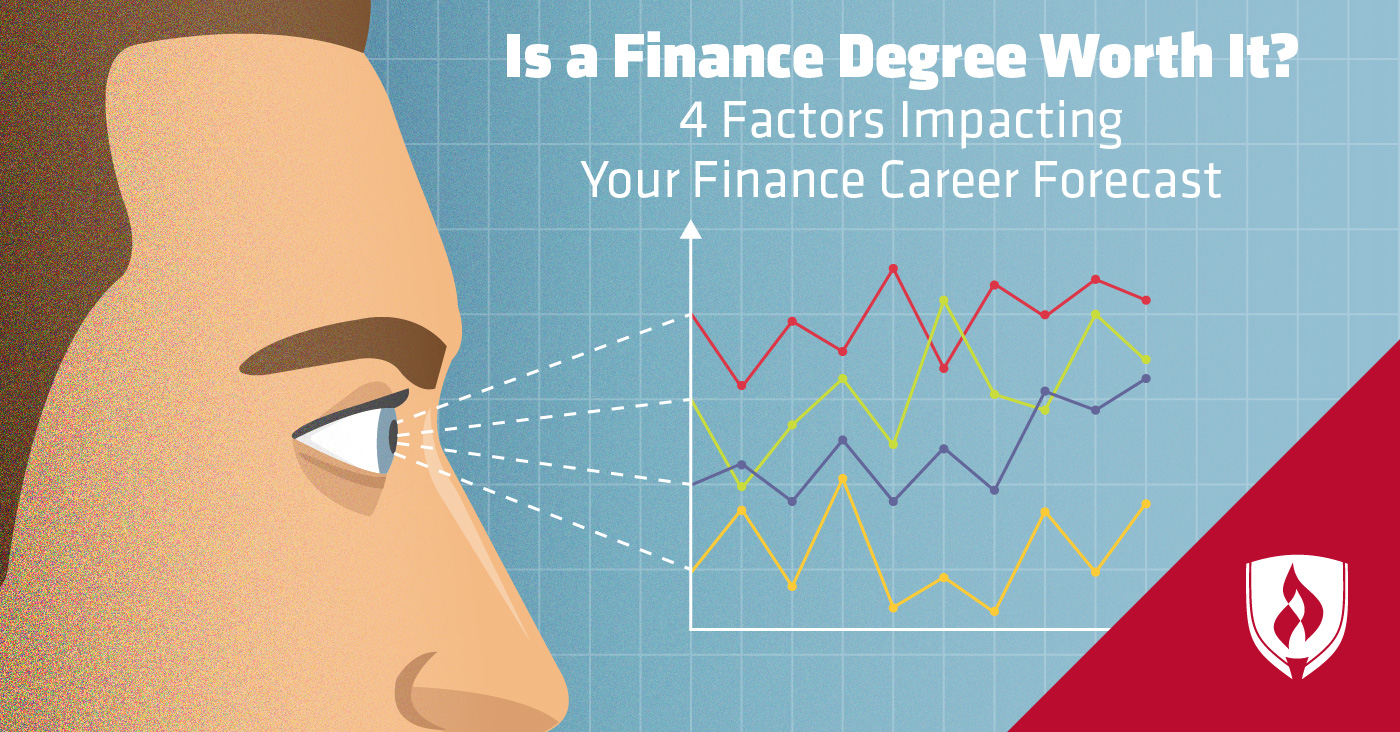Is a Finance Degree Worth It? 4 Factors Impacting Your Finance Career Forecast
By Will Erstad on 07/31/2017

With the glitzy media portrayals of Wall Street’s wheeling and dealing, it’s easy to understand the allure of a finance career. Whether you get a kick out of tracking the stock market or just think finance sounds like an interesting career field, it’s always worth the time to do your research before committing to a Finance degree program.
So is a finance degree worth it? There’s really no cut-and-dry answer to this as it ultimately comes down to you and your preferences. But to help you determine your decision, we compiled four key questions worth considering before pursuing a future in finance.
4 questions to help determine if a finance degree is worth it
Before you commit to a finance career, there are a few important considerations you should be making. Start with the following questions:
1. What does the job market look like for finance professionals?
An important question to consider is whether the job market is strong for finance-related positions. Earning a good paycheck is great, but if competition for those positions is fierce, it may not matter.
One way to gauge employment prospects is with the BLS’ employment growth projections. According to the numbers, all five of the finance positions highlighted above are expected to see growth in the coming decade. Take a look at the percentages:
- Loan officer: 8% increase
- Financial examiner: 10% increase
- Financial analyst: 12% increase
- Personal financial advisor: 30% increase
- Financial manager: 7% increase
The BLS lists the average projected growth for all occupations as 7 percent. This suggests that the future is bright for professionals hoping to find a job in the finance field.
2. What education and training is needed to enter the finance field?
Finance careers certainly have some positives when it comes to job security and financial stability. But another important factor to consider is what it will take to become qualified for one of these positions.
Financial professionals take on a lot of responsibility within their prospective companies, so it’s not surprising that education and training are a necessity. We used real-time job analysis software to examine more than 1.4 million finance job postings from the past year.2 The data helped us identify the preferred education levels employers are seeking. Here’s what we found:
- Loan officer: 60% require Bachelor’s degree
- Financial examiner: 96% require Bachelor’s degree
- Financial analyst: 95% require Bachelor’s degree
- Personal financial advisor: 79% require Bachelor’s degree
- Financial manager: 87% require Bachelor’s degree
Our analysis shows that employers value candidates who have a Bachelor’s degree in Finance. In addition to a formal education, there are some certifications that can help improve your job prospects in the field. Here are a few of the in-demand options:
- Certified public accountant (CPA)3
- Series 7
- Certified financial planner (CFP)
- Chartered financial analyst (CFA)
- Personal financial specialist (PFS)
3. What does the career mobility look like?
Ideally, you will enjoy your career from day one until you retire. But it's always a good idea to plan for changes. Does a finance degree mean you have to continue working in finance unless you get a new degree?
As a finance major, your studies will focus on managing money—and other valuable assets. Finance professionals, though their roles may vary, are generally responsible for making calculated decisions regarding:
- Borrowing
- Budgeting
- Investing
- Lending
You’ll complete coursework designed to sharpen your analytical skills. In addition, you can expect to study statistics and economic theory, in order to better identify and predict patterns in real-life scenarios. All of these skills are very transferable to tons of different careers. Consider how useful this knowledge and experience would be for a manager or an entrepreneur.
Earning a finance degree doesn't mean you have to work in finance. Every business and non-profit organization can benefit from professionals who understand money. Rasmussen’s Finance degree program also provides the opportunity to deepen your knowledge of the following:
- Financial modeling
- Strategic management
- Investment portfolio management
- Business law
- Team leadership
- International finance
4. What is the work like for finance professionals?
The work of a finance professional can vary greatly depending on the specific company and position. But to give you a taste of the types of roles and responsibilities you may be tasked with, we compiled a list of common job duties for the five finance careers we’ve profiled.
Duties of a loan officer:
- Meet with loan applicants and gather relevant financial information
- Review loan agreements to ensure compliance with regulatory standards
- Explain different loan structures and the terms involved
Duties of a financial examiner:
- Review balance sheets, loan documents and other financial accounts to confirm an institution’s assets and liabilities
- Review new regulations and create plans to ensure compliance
- Report on details of an institution’s financial safety and soundness
Duties of a financial analyst:
- Examine an institution’s financial statements to determine its value
- Recommend investment strategies or portfolios to clients
- Study and evaluate economic and business trends
Duties of a personal financial advisor:
- Meet face-to-face with clients to discuss financial goals and strategies for reaching them
- Educate clients on investment options and the potential risks they may face
- Guide clients financially through life-events like retirement
Duties of a financial manager:
- Review financial reports and seek out ways to reduce costs
- Assist senior management with financial decisions
- Prepare financial statements, reports and forecasts
So is a finance degree worth it?
At the end of the day, only you can decide whether a finance degree is worth your time. If you are fascinated by the world of finance and can picture yourself thriving in one of the positions highlighted above, then you should strongly consider taking the steps to become a qualified job candidate.
No matter which finance profession interests you, a formal education is a smart investment toward your career. Learn more about how a Finance degree can help equip you for a rewarding future in finance.
RELATED ARTICLES:
- 8 Signs You Have What It Takes to Major in Finance
- Finance vs. Accounting: Which Degree Is Right for You?
- What Does a Financial Analyst Do? Beyond the Numbers
- Reading Between the Lines: A Closer Look at the Financial Analyst Job Description
- 19 Finance Blogs Worth Following in 2019 in Beyond
- Women in Finance Reveal What it Takes to Get to the Top
1Data represents national, averaged earnings for the occupations listed and includes workers at all levels of education and experience. This data does not represent starting salaries and employment conditions in your area may vary.
2Burning-Glass.com (analysis of 1,495,175 finance job postings, July 1, 2016 – June 30, 2017).
3 This program is not designed to prepare graduates for any state-issued professional license or certification. This Accounting program does not meet all educational prerequisites for licensure as a Certified Public Accountant (CPA) in any state. For further information on professional licensing requirements, please contact the appropriate board or agency in your state of residence.




